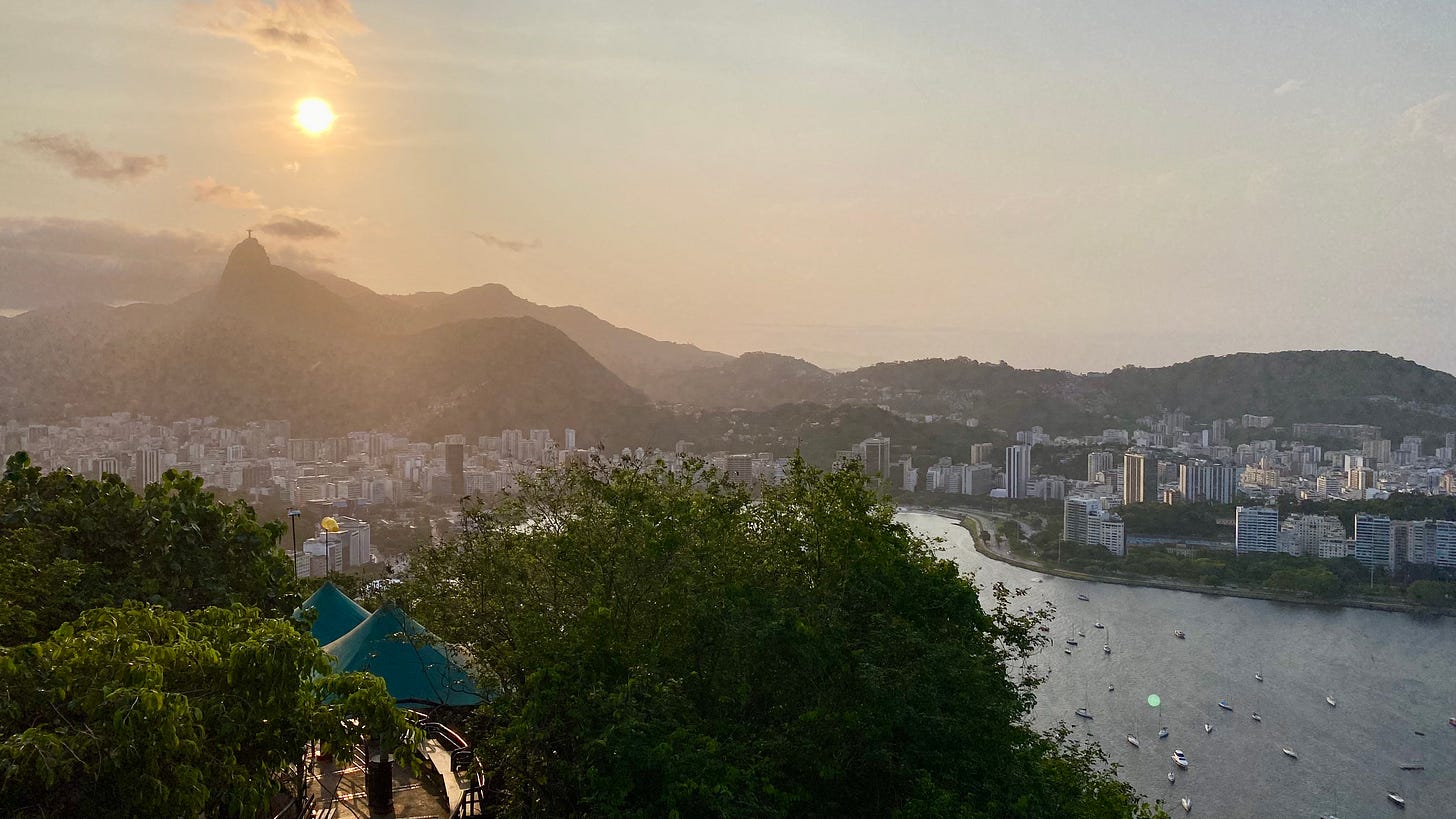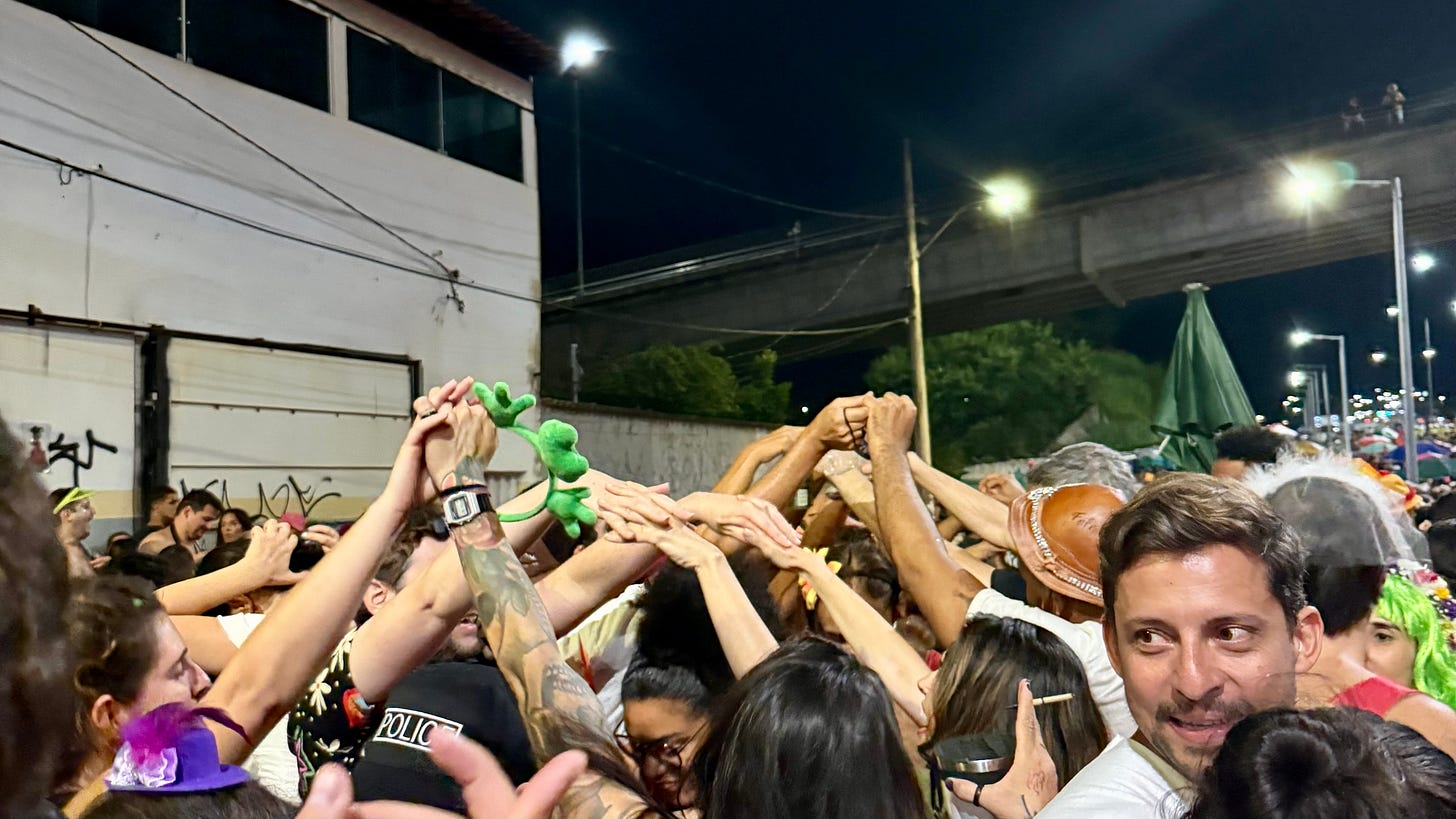I Thought Brasilian Portuguese Was Ugly
How climate, culture, and kindness changed what I was hearing.
The first time I really listened to Brasilian Portuguese, it grated on my ears.
I boarded an 18-hour sleeper bus from Iguazú Falls to São Paulo, tracing the goosebumps on my arms from the blasting AC. Two guys from Rio sang, “Bem viiiinda,” as I found my seat, their words melting even in frigid air.
I smiled warmly, but my throat recoiled.
I repeated their words until I connected “bem vinda,” to Spanish’s “bienvenida.” Welcome. Still, I didn’t hear the music.
People said Brazilians sang when they spoke — that it was rhythmic, warm, musical. But what I heard was vowels collapsing onto each other. A language without the crisp edges of Spanish, or the tight corners of English. This sounded like watercolor, when all I had known was ink. And for 18 hours, I couldn’t find the melody.
I will hate this language forever, I thought, teeth clenched somewhere between Iguazú and São Paulo.
They were shaped by places where sound doesn’t linger.
A year later, I returned to Brasil — but only because I had nowhere else to go.
I flew to Brasil from Sarajevo, frantically fleeing the frat boy vibes of ‘European summer.’ Brasil brought me back to my favorite continent, with so much left to explore.
Prove yourself to me, I dared Brasil. Make the most of your second chance.
"Tudo bem?,” a cashier asked me in Florianópolis, an almost-island off of Brasil’s southern coast.
“Tudo bem. Tudo bem?,” I replied, a phrase that fell out of my mouth on reflex.
And so began all of the ways that I settled into Brasil. I watched YouTube videos in my studio apartment that taught me to say, “can I try this?,” and “where is the bathroom?” I spent sunny afternoons staring at the Atlantic, rushing into too-cold waters. I filled grocery bags with caju juice and açai. But still, I dreamed of running off to Buenos Aires — a city I understood, only a bus ride away.
Until, slowly, I began to hear it.
Not all at once, but in moments:
A stranger in a coffee shop teaching me when an “r” turns into an “h” and when it rolls;
A friend calling me carinha in a voice note, with affection that didn’t need translation;
Someone teaching me the word cafuné — the act of running your fingers through someone’s hair.
Or maybe, it was the 37th “Tudo bem?”
Not just how are you, but: are you good?, are we good?, isn’t life good?
The noise turned into rhythm. I didn’t understand the words, but I began to hear the music beneath them.
So I joined the chorus, off-beat and off-key.
And I began to ask myself: why were we singing?
These weren’t peaceful mergers. They were voices meant to be erased. But the melodies stayed.
Why did Brasilian Portuguese sound so different than its Portuguese mother?
In Lisbon, my host explained the differences to me at his kitchen table. Obrigada, or thank you: in Portugal, the ending is tight, almost swallowed. In Brasil, it opens like a flower.
But why?
One theory is this: climate shapes sound. In humid places, sound floats. Vowels stretch, breaths extend, and consonants soften. In dry places, sounds snap shut, because dry vocal cords can’t sing.
It made sense. Every language I’d known before — the American English of Chicago, the Tigrinya of the Eritrean highlands, the Spanish of the Andes — came from dry air. They were shaped by places where sound doesn’t linger.
But the more I listened, the more I saw: climate shaped sound, but culture shaped song.
Portuguese didn’t float across the Atlantic and warm itself in the sun. It morphed and changed in the many mouths that spoke it.
One of my closest friends in Brasil used to be a history teacher. He isn’t anymore, but he loved to teach me about Brasil’s layers — migration, loss, resistance.
And I wondered, did language remember that?
So I began to notice how Indigenous languages, like Tupi, gave Brasilian Portuguese its soft consonants, nasal vowels, and unique vocabulary. And how Afro-Brazilians — forced onto this land — infused the language with rhythm and melody, drawn from Yoruba, Bantu, and other West African languages shaped in equally warm air.
These weren’t peaceful mergers. They were voices meant to be erased. But the melodies stayed.
And I went back to my friend, the history teacher, who told me that today’s Brasilian Portuguese echoes not just them, but the French, the Dutch, the Italians — all those who arrived and became, forever or for a moment, Brasilian.
In Portugal, speech is tight, fast, and efficient — built for cold winds and crowded cities. But in Brasil, words stretched across vast lands. Music — samba, forró, bossa nova — folds back into the language until song and speech blur.
Sound travels freely. There’s no reason to speak small, so people don’t.
Because the music didn’t live in the language; it lived in how people used it.
In São Paulo, I went to a salon to get my hair braided.
"Oi, linda! Tudo bem? Entra, entra!" (Hey, beautiful! All good? Come in, come in!), a stylist said to me, her voice rising like a melody as her customers filled the space with laughter. When I didn’t know what I wanted for breakfast, they ordered me everything: tapioca, pão de queijo, bolo. They clapped as I tried each one, and my face flushed.
“Oi, querida,” someone else said to me as she kissed me once on each cheek. This was Brasil’s casual intimacy, the way that amor, querida, linda — love, dear, beautiful — are shared like pocket change between friends and strangers. I stumbled over my words, not knowing how to say amor back without sounding like I was playing a part.
Brasil’s culture, too, was shaped by the warm air. Warmth — like vowels — stretched longer here.
And in every tudo bem, I hear it.
Not, how are you?
But, are you good?
Are we good?
Isn’t life good?
As I traveled around Brasil, I heard the playlist — same language, different tempos.
In Rio de Janeiro, it’s samba. Every word flirts, and s turns into sh. Amoooooor, Cariocas call out as they walk to the beach.
In São Paulo, it’s jazz. The words move quickly. Paulistas have meetings to run and places to be, but they’ll remember your name. Share a book. Bring you a coffee.
In Belo Horizonte, it’s a ballad. In true Mineiro hospitality, they invite you into their story — intimate, melodic, and unhurried.
And in Salvador, it’s drums. Baianos speak in rhythm, and conversations feel choreographed — nodding heads, swaying arms. Their kindness doesn’t simmer; like percussion, it bursts.
I will hate this language forever, I had thought, teeth clenched somewhere between Iguazu and São Paulo.
But now, I eavesdrop on conversations in Portuguese as I walk into my weekly forró class. I sing along to samba and MBP in my kitchen. I send choppy voice notes across continents, smiling as my friends’ voices sing back to me.
My accent still sharpens words that should blur. My words grate on my ears, like a parrot with a head cold.
But I remember how sound travels freely in Brasil. I remember the heat, the rhythm, the people who didn’t speak small. And so I continue singing.
Very Lost is about my travel sabbatical — and now, about returning home. If you’re new here, check out some of my most popular essays: on climbing a mountain in Nepal, why some strangers are kind, my Eritrean heritage, and saying goodbye.






This line, Zefan.. Holy cow. "This sounded like watercolor, when all I had known was ink." Beautiful. 😍
I adore this! I've been studying Brazilian Portuguese for the past two years, and I've wanted to go to visit Brazil for years, and I'm finally going this fall to Rio. This inspired me to take my language study more seriously, it's always been an intimidating but beautiful language to me. What was your learning process like? Especially as someone who knows Spanish too.